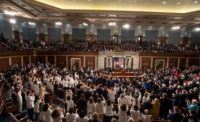With President Trump and leading congressional Democrats expected to meet soon to discuss how to pay for a major new infrastructure investment package, House Majority Leader Steny Hoyer (D-Md.) says it will be crucial for Trump to push for a funding solution if a plan is to be enacted.
On April 30, Hoyer, along with House Speaker Nancy Pelosi (D-Calif.), Senate Minority Leader Chuck Schumer (D-N.Y.) and other top Democrats, met with Trump to talk about an infrastructure plan. [ENR.com article posted 4/30/19]
Democrats said they and Trump agreed to work toward a $2-trillion, multi-year initiative. But they deferred deciding the critical issue of how to pay for such a program, agreeing to meet again in about three weeks.
Speaking at a May 13 Washington, D.C., kickoff event for the seventh-annual Infrastructure Week program, Hoyer said, “If the president does not lead on how we’re going to fund this infrastructure investment, it will not happen.” [Read prepared text of Hoyer's remarks here.]
Hoyer also said, "The president must be ready to lead and convey to the American people the critical importance of substantial investment in infrastructure now and in the future."
In line with other reports of the April 30 meeting, Hoyer said that Democrats went into the session planning to suggest a plan with a price tag of $1 trillion or $1.5 trillion. But then, according to Hoyer, Trump said, "That doesn't sound high enough to me. We need to do two [trillion]."
Hoyer added, "Of course, we all said, 'Amen.' "
But in a May 4 tweet, Trump appeared to modify his $2-trillion fiigure, saying he is "looking hard at" a plan valued at $1 trillion to $2 trillion.
Hoyer told the attendees at the Infrastructure Week event that Democrats are working on infrastructure financing possibilities. Speaking with reporters after his speech, Hoyer noted that the House Ways and Means Committee has held a hearing on the topic and that House Transportation and Infrastructure Committee Chairman Peter DeFazio (D-Ore.) also has proposed some options.
The largest is DeFazio's "Penny for Progress" proposal, which would raise $500 billion for infrastructure by issuing new 30-year bonds. They would be repaid by revenue from hiking the federal gasoline and diesel taxes to reflect highway construction cost inflation and the impact of lower fuel use from more fuel-efficient vehicles.
Hoyer also said he has long supported increasing the gas tax, which, he said, "in my personal view, needs to be part of the solution" to the infrastructure revenue question.
The gas tax last was raised 26 years ago, to 18.4¢ per gallon. "It's upsetting," Hoyer said, "that we think we can pay 2019 costs with 1993 income."
For water infrastructure, DeFazio's committee on May 8 cleared legislation that aims to increase spending of revenue that flows into the Harbor Maintenance Trust Fund on port dredging projects. The fund has an estimated balance of $9.3 billion, the committee says.
For aviation, DeFazio has called for removing the cap on passenger facility charges, an important financing source for airport infrastructure projects. The cap has stood at $4.50 since 2000.
The scope of Democrats' infrastructure plan would be wide. Hoyer said that highways, bridges, transit, seaports and airports "are the core on which any package will be built." But he added that water and sewer infrastructure was important, along with broadband and wireless internet. as well as a resilient and reliable electrical grid that would include tapping renewable-power sources. He would include nuclear power in the renewables category.
Asked about the timing for infrastructure legislation, Hoyer demurred, saying it was "premature" to say. He also said it would be "unrealistic" to expect an agreement on an infrastructure financing plan at Democrats' next meeting with Trump later in May.



Post a comment to this article
Report Abusive Comment